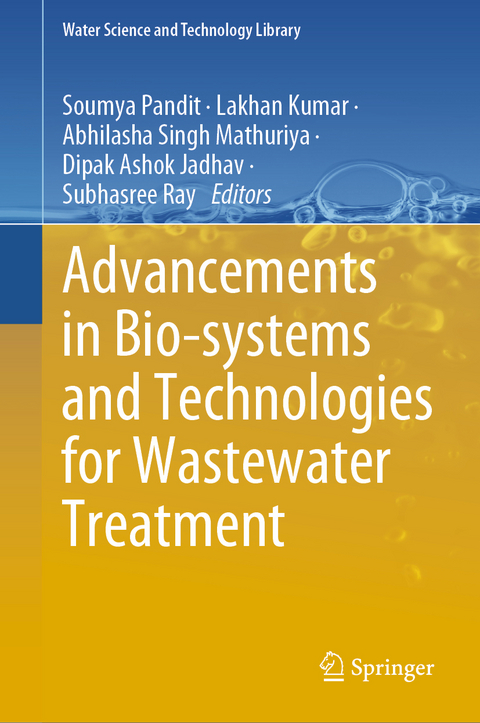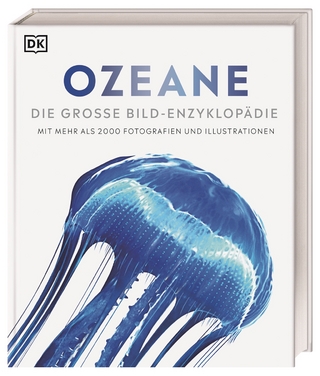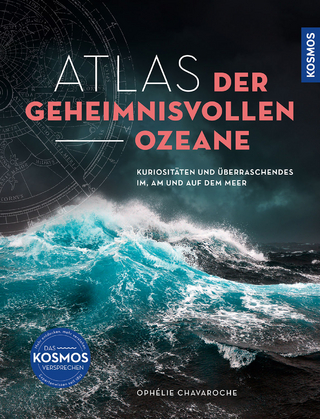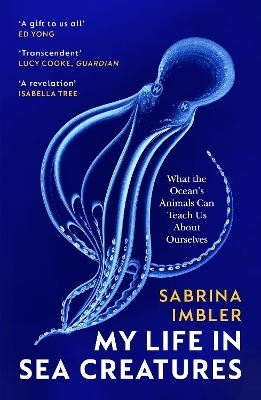
Advancements in Bio-systems and Technologies for Wastewater Treatment
Springer International Publishing (Verlag)
978-3-031-58330-8 (ISBN)
This book explains the main problems of industrial wastewater treatments and how they are being treated by innovative biological processes. The need for clean water in developing countries has become difficult to achieve as a result of globalization and industrialization and because of an increase in population, urbanization, and per capita water use.
Residential, commercial, industrial, and educational institutions produce immense amounts of wastewater. Wastewater is treated to extract toxins to produce processed effluent by physical, chemical, and biological processes. Most of these innovative treatment systems are membrane filtration, advanced oxidation processes, and electrochemical approaches, which are strongly committed to offering solutions to help protect public health and the environment.
For wastewater treatment, different forms of bioreactors are used which are reliable, cost-efficient, and effective in removing a wide variety of contaminants.
This book outlines the capacity of various bioreactors that are most widely used for the treatment of different industrial and domestic wastewater, such as a rotating biological contactor, biological fluidized bed reactor, packed bed reactor, membrane bioreactor, continuous stirred tank bioreactor, up-flow anaerobic sludge blanket reactor, and photobioreactor, etc.
Despite this, the acceptance of these technologies and their commercialization on an industrial scale, the performance is still limited. Therefore, a broader use of cost-effective in situ remedial approaches to natural phenomena like bioremediation is needed. The role of numerous bioreactors in industrial effluent treatment has, including recent developments, also been explored in depth. Furthermore, it includes the operational factors affecting their performances, advances in their architectural design, their amalgamation with the existing setup, scale-up studies, life cycle assessment of those reactors, materials and cost analysis, etc. This information helps the reader to understand the insight into the mechanism, pros and cons, moreover efficient utilization, and commissioning of bioreactors.
Dr Soumya Pandit is currently working as Associate Professor at Sharda University, Greater Noida, Delhi NRC, India. He pursued his doctoral studies from Bioprocess Engineering Lab, Department of Biotechnology, Indian Institute of Technology, Kharagpur in 2015 and completed his postdoctoral research work at in the Zuckerberg Institute for Water Research (ZIWR), Ben-Gurion University of the Negev, Israel, took training from University of Liieda, Spain. He joined as assistant professor at Amity Institute of Biotechnology, Amity University, Mumbai. He has published various papers at international conferences in environmental biotechnology and bioenergy. He has authored one text book on Industrial Biotechnology and edited 4 books. He has authored more than 140 peer reviewed research and review papers in peer-reviewed journals such as (1) Bioresource Technology, (2) International Journal of Hydrogen Energy, (3) ACS applied Materials and Interface, (4) Chemical Engineering Journal, (5) Biosensor and bioelectronics, (6) ACS Environmental Science and Technology, (7) Journal of Membrane Science, (8) Journal of Cleaner Production etc.; He has authored more than 60 book chapters and published 24 Indian patents (5 granted) so far (H index - 39). He is working from the last 15 years in the area of microbial electrochemical system for bioenergy harvesting, bacterial biofilm and biofouling study, biohythane production; microalgal biomass production for biofuel; nanomaterial synthesis and application in bioenergy harvesting and biofouling mitigation etc. He has also presented his work at several national and international conferences, and received a few best Oral and poster awards from NITs.
Dr. Abhilasha Singh Mathuriya currently serves as the Scientist D in the Ministry of Environment, Forest and Climate Change, Government of India. Previously, she held the position of Associate Professor and Head in the Department of Life Sciences and Head, Bio-POSITIVE, at Sharda University, India. She holds an M.Tech. in Biochemical Engineering and a Ph.D. in Biotechnology. She remained a brilliant scholar and has held top positions in the college and university merit list. Her area of interest is bioelectrochemical systems, bioproducts, fermentation and biological wastewater treatment. Dr. Mathuriya has authored 62 high-impact factor papers, 02 books, 20 book chapters and edited 3 books. She has applied for 42 patents related to bioelectrochemical reactor designs, electrode materials and catalysts, with 12 patents granted. Dr. Mathuriya has successfully managed two externally funded research projects from the Department of Science and Technology (DST) and the Defence Research and Development Organization (DRDO).
Dr. Dipak is an Assistant Professor of School of Civil and Environmental Engineering in the JSPM University, Pune, Maharashtra, India. Also, he is associated as a Research Professor at Department of Environmental Engineering at Korea Maritime and Ocean University, Busan, South Korea. He did PhD from School of Water Resource, Indian Institute of Technology (IIT)
Kharagpur on development of scalable microbial fuel cell (bioelectric toilet) for sanitation applications. Dr Dipak has 6 years of post PhD experience including academic and research positions. Earlier, he was worked as Assistant Professor, Maharashtra Institute of Technology, Aurangabad, India. During M.Tech, he received DAAD fellowship to work in Technical University Braunschweig, Germany. Dr. Jadhav has received several prestigious awards and fellowships including Young Technological Innovation Award (GYTI) at Rashtrapati Bhavan, IEI-Promising/Young Engineers Award, Brain Pool fellowship, Swachhta Sarthi Fellow, DAAD-IGCS fellowship, Silver medal for post graduate studies at IIT Kharagpur and many more. His research area
includes microbial fuel/electrolysis cell, Bioelectrochemical system, Environmental electrochemistry fo
Microbial electrochemical systems.- Membrane Bioreactor.- Electro-Fenton Assisted Bioprocesses.- Bio-Desalination techniques.- Anaerobic biodigesters.- Thermophilic digesters.- Constructed wetland and submerged aquatic plants .- Activated Sludge Process.- Upflow anaerobic sludge blanket.- Biological Aerated filters.- Fluidized bed reactor.- Trickling Bed Bioreactors.- Algal bioreactors for autotrophic and mixotrophic biomass production.- Hydrogen producing bioreactor.- Anaerobic Sequencing Batch Reactors for Biohydrogen production.-Sequential batch bioreactors .- Advanced oxidation bioprocesses.- Hybrid bioreactors.- Anammox.- Life Cycle assesment of Bioreactors.- Advanced technologies in wastewater treatment and resource recovery (Chanchal Majumder).
| Erscheinungsdatum | 01.08.2024 |
|---|---|
| Reihe/Serie | Water Science and Technology Library |
| Zusatzinfo | IX, 331 p. 47 illus., 39 illus. in color. |
| Verlagsort | Cham |
| Sprache | englisch |
| Maße | 155 x 235 mm |
| Themenwelt | Naturwissenschaften ► Geowissenschaften ► Hydrologie / Ozeanografie |
| Schlagworte | Activated sludge process • Anaerobic digester • bioreactor • COD Removal • pollutant removal • wastewater |
| ISBN-10 | 3-031-58330-2 / 3031583302 |
| ISBN-13 | 978-3-031-58330-8 / 9783031583308 |
| Zustand | Neuware |
| Haben Sie eine Frage zum Produkt? |
aus dem Bereich


